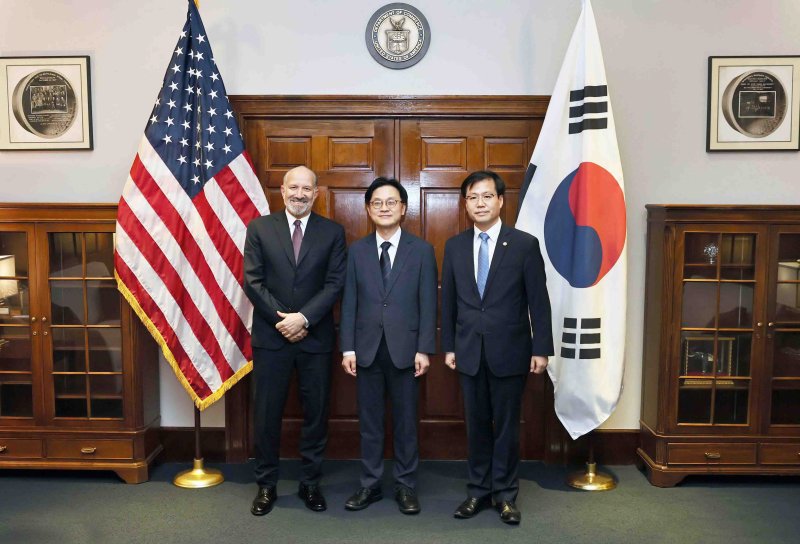"Tough Negotiator Kim Jung-kwan"... Behind the Scenes of the Key Players in the Tariff Negotiations
- Input
- 2025-10-30 13:02:46
- Updated
- 2025-10-30 13:02:46

[Financial News] The United States–Korea Tariff Negotiations were so intense that U.S. President Donald Trump described Kim Jung-kwan, Minister of Trade, Industry and Energy, as a "very tough negotiator." Behind President Trump's unusual remarks was the tireless effort of the government negotiation team—including Minister Kim, Yeo Han-koo, Chief Negotiator for Trade, and Koo Yun-cheol, Deputy Prime Minister and Minister of Economy and Finance—who spent nearly three months shuttling between Washington, D.C. and Scotland, working around the clock at the negotiation table.
According to the government on the 30th, the two countries held 23 ministerial-level meetings with the United States Department of Commerce (DOC) and dozens of working-level consultations before reaching the final agreement in the United States–Korea Tariff Negotiations.
At the Asia-Pacific Economic Cooperation (APEC) CEO Summit in Gyeongju the previous day, President Trump directly referenced Minister Kim's negotiation skills, stating, "It would have been better for the U.S. if we had met someone a bit less formidable." It was an extraordinary comment, as it is rare for a head of state to publicly acknowledge the tenacity of a counterpart minister.
Since taking office in July, Minister Kim has led the tariff negotiations from the front lines for 100 days. At a press briefing last month, he shared, "There were moments when voices were raised and fists hit the table during the negotiations," adding, "It was a process of finding a win-win solution for both Korea and the United States."
He also mentioned that during his business trips to the U.S., he repeatedly watched the film 'The Fatal Encounter.' Quoting a passage from the 23rd chapter of the Doctrine of the Mean, he said, "If you devote yourself wholeheartedly, even to the smallest things, you can change the world. I gave my all to achieve even slightly better results."
This attitude was evident in the actual negotiations. The first round of tariff talks, which reached a dramatic conclusion on July 30, was the result of an emergency negotiation after the planned '2+2 meeting' between the finance and trade ministers of both countries was unilaterally canceled by the U.S. side. Upon learning that Howard William Lutnick, U.S. Secretary of Commerce, would be accompanying President Trump to Scotland, Minister Kim and Chief Negotiator Yeo Han-koo canceled their return flights and immediately traveled to Scotland to continue the talks. It is highly unusual in diplomatic practice for negotiators to follow their counterparts to another country for direct negotiations.
Yeo Han-koo explained, "If Secretary Lutnick was at his home in New York, we went there; if he was in Scotland, we followed him there and continued negotiations past midnight. Ultimately, our face-to-face meeting in Scotland became the turning point for drafting the agreement text."
Koo Yun-cheol played a dual role as both negotiator and coordinator. He mediated differences among the Ministry of Trade, Industry and Energy, the Ministry of Foreign Affairs, and the Presidential Office, while also overseeing detailed matters related to finance and investment.
Since taking office, all three of his overseas trips have been to the United States. Just ten days after his appointment, on July 29, he visited Washington, D.C. for his first diplomatic mission, where he spent four days negotiating and paved the way for a mutual tariff reduction agreement. In October, he attended the Group of Twenty (G20) Finance Ministers' Meeting and the annual meetings of the International Monetary Fund (IMF) and World Bank, where he held a series of talks with U.S. Treasury Secretary Scott Bessent to discuss trade and investment issues.
Meanwhile, on the 30th, Koo Yun-cheol emphasized regarding investment in the United States, "We will swiftly prepare a special law to establish a financial package fund and ensure it is submitted to the National Assembly of the Republic of Korea." At the comprehensive audit of the National Assembly's Planning and Finance Committee that day, he stated, "We will move as quickly as possible, and if we submit it in November, it will take effect from November 1."
Once the government submits the bill, the reduction of tariffs on U.S. imports to 15 percent is expected to be retroactively applied to the month of submission.
Koo Yun-cheol explained, "With the conclusion of these negotiations, uncertainty over exports to the U.S. will be eased, and by securing tariff rates equivalent to those of major countries such as Japan and the European Union (EU), it will help Korean companies expand their entry and market share in the U.S."
aber@fnnews.com Park Ji-young, Hong Ye-ji Reporter